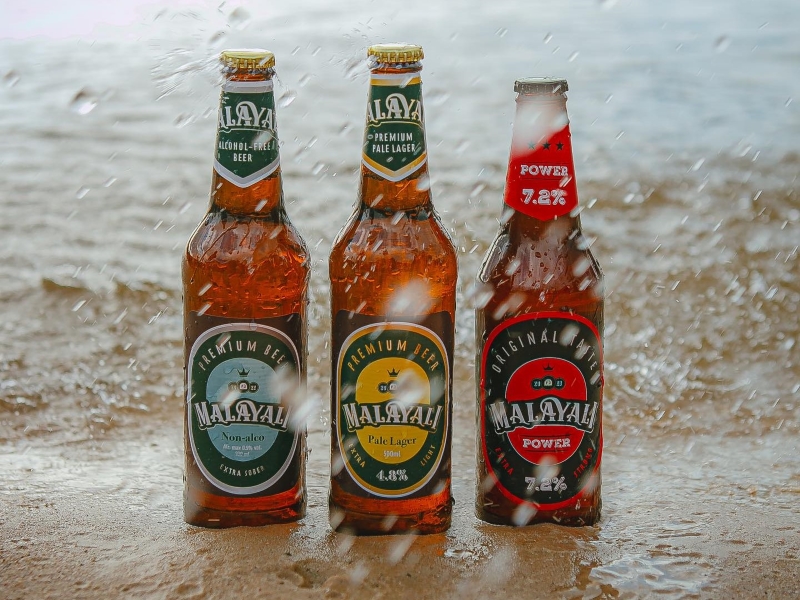
Pradeep Kumar Nayar (left) and Chandramohan Nallur of the Polish-based Malayali beer (Photo: Diana Khoo/ The Edge)
Everyone knows an icy cold beer is the best way to fortify one’s constitution in the tropics. Thankfully, there is no shortage of choice. From Teutonic weissbier to a low-malt Japanese happoshu, Malaysian imbibers have it good. However, a new biyar (beer in Malayalam) brand is set to enter the local, Indonesian and Singaporean markets shortly. And, from its very name, Malayali is certain to get the tannee-loving community talking.
Those familiar with Indian culture will immediately know that Malayali beer is an homage to the people of Kerala. “Most of us appreciate a good drink,” says Palakkad-born Chandramohan Nallur, 39, one of its co-founders. “We celebrate life. And this shows through all aspects, even in our movies. Most Indian films portray alcohol in a negative light, favoured by gangsters and the bad guys. But in Malayalam-language shows, you would often find the heroes are the ones enjoying or rejoicing with a drink.”
Founded in Warsaw, Poland, by Chandramohan, together with Sargheve Sukumaran and recently joined by Pradeep Kumar Nayar — managing director of Vistula Foods, one of the largest exporters of Polish apples to several markets, who came on board as an investor and mentor — the hybrid beer brewed in Poland and the Czech Republic using European hops and Indian rice flakes is undoubtedly a conversation starter. It also owes its birth to the most unlikely of circumstances. Chandu, as he is popularly known and a teetotaller to boot, suddenly found a client of his saddled with 20,000kg of parboiled rice flakes. The shipment, originally destined for Europe’s cereal market, was in jeopardy after the 2022 invasion of Ukraine sent currency exchange fluctuations into overdrive — and caused the business associate to baulk.
462999512_17976613964783492_8297301227643627838_n.jpg

“I had to quickly figure a way out,” says Chandu, who is also head of business relations at the Indo-Polish Chamber of Commerce. “Initially, I thought of converting the rice flakes into animal feed but getting certification would have taken up to nine months. Holding onto the stock would have incurred high costs, not to mention taking up precious storage space. Meanwhile, sending it back would have meant a total and outright loss. You wouldn’t believe it but I decided to ask Google what to do with five containers of rice flakes, and beer popped up as a potential solution. So, yes, Malayali is a completely accidental business. I don’t even drink myself, so entering the industry was never in my plans. But I like how something productive came about as the means of solving a crisis.”
Better than mere productivity, Malayali seems to have outperformed expectations, selling out 50,000 bottles in the initial two months, after which a growth trajectory that would make investors salivate promptly followed. “We started the business in November 2022, with products officially hitting the Polish market in July 2023,” says Chandu. “A few Indian restaurants were interested. That’s how we began. From then to December 2023, we sold another 36,000 bottles. From January to August this year, we sold 155,000 bottles and are now ready for the export market.” Fun fact: Poland has almost 500 Indian restaurants scattered throughout the vast country and, to date, Malayali beer is present in about 117 establishments. “Warsaw alone has 144, of which we are available in 39 … and counting,” he beams. Talks are underway with two European supermarket brands while the first shipment of Indian-inspired, Polish-brewed beer should reach Southeast Asian shores before the year is out.
Although the beer recently changed its labelling (the original was a right winner though, featuring a moustachioed caricature of the legendary Mohanlal in the 1990s hit film Spadikam wearing the state’s iconic Kathakali headgear; however, an accompanying aviator sunglass motif presented copyright issues, necessitating the tweak), its delicious taste remains the same. The hops make for a crisp and refreshing swig, as expected, but the inclusion of the rice flakes lends the brew a greater smoothness and subtle sweetness.
Fans may pick from three main variants: Light (4.8%), Power (7.2%) and a non-alcoholic version which debuted last summer. The light and non-alcoholic beers now feature bright labels in yellow and light blue respectively, while the punchy Power is bright red. And while it looks like smart and simple packaging design, there is deeper thought and mindfulness behind the move.
“The red, since it is our strongest beer, pays homage to Old Monk, India’s most famous and beloved rum, while the yellow and blue are actually a tribute to Ukraine — the real reason behind Malayali’s birth,” Chandu explains.
Although it sounds novel, Malayali is by no means the first Indian (or Indian-inspired) beer of international origin. Komban, for example, is a UK-brewed beer using the Belgian technique while Kamasutra is an Italian lager. But composition and ancestry aside, the very nature of Malayali’s beers also makes them incredibly versatile.
Suitable for everything from a big hunk of grilled meat to seafood and, yes, they are practically made for coconut-based dishes and spicy curries, you would find the beers going down easily with most foods. And considering the brand’s imminent arrival, imagine the sheer fun one can have, organising a pairing party to experiment and find out if the lighter lager or more potent variant tastes better with appam and stew? Or better yet, bring a few bottles (worry not as the non-alcoholic version makes Malayali accessible to all) along to the next social gathering and see what your Malaysian-Malayalee friends have to say.
This article first appeared on Sept 30, 2024 in The Edge Malaysia.


